| Srl | Item |
| 1 |
ID:
056319
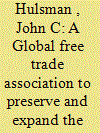

|
|
|
| 2 |
ID:
131852
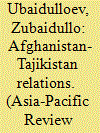

|
|
|
|
|
| Publication |
2014.
|
| Summary/Abstract |
This article attempts to touch upon the relations between Afghanistan and Tajikistan, two neighboring countries, from the historical perspective and the current period. The article analyses the history of Afghanistan-Tajikistan relations during and after the Soviet era, especially during the Afghan Mujahideen's struggle against the Soviet occupational army and Taliban regime in Afghanistan, the Tajikistan civil war of 1992-1997, and after September 11, 2001. In addition, the issues of the ethnic Tajiks in Afghanistan, the violent and vulnerable Tajik-Afghan border, the withdrawal of NATO troops from Afghanistan in 2014 and its impact on Afghanistan-Tajikistan relations, and the new phase of economic relations and an effective cooperation between the both countries are discussed. The article tries to fill the gaps within the body of existing literature and understanding concerning the topic.
|
|
|
|
|
|
|
|
|
|
|
|
|
|
|
|
| 3 |
ID:
078044
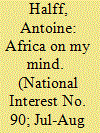

|
|
|
| 4 |
ID:
060280
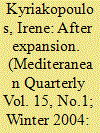

|
|
|
| 5 |
ID:
122350
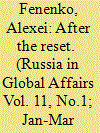

|
|
|
|
|
| Publication |
2013.
|
| Summary/Abstract |
The general environment of U.S.-Russian relations up to 2020 will remain conflict-prone, especially as Russia and the United States lack a complex of stabilizing economic ties, like those in U.S.-Chinese relations. The nuclear missile parity remains the sole stabilizer.
|
|
|
|
|
|
|
|
|
|
|
|
|
|
|
|
| 6 |
ID:
051385
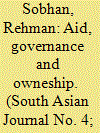

|
|
|
|
|
| Publication |
Apr-Jun 2004.
|
|
|
|
|
|
|
|
|
|
|
|
|
|
|
|
| 7 |
ID:
015460
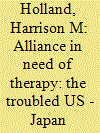

|
|
|
|
|
| Publication |
Winter/Spring 1993.
|
| Description |
186-225
|
|
|
|
|
|
|
|
|
|
|
|
|
|
|
|
| 8 |
ID:
127061
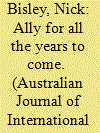

|
|
|
|
|
| Publication |
2013.
|
| Summary/Abstract |
In 2011, Australia communicated a clear choice about its strategic future. It would continue to cleave tightly to the US alliance, expand its military links and work to advance the USA's conception of regional order. Given its economic interests, why has Australia bound itself to the US alliance? What lies behind this strong commitment and what would it take for Australia to change its relationship with the USA? This article presents an analysis of the current state of the US-Australia alliance and argues that Canberra's pursuit of close relations with the USA reflects the interaction of a rational calculation of the costs and benefits of the alliance with a set of resolutely political factors that have produced the current policy setting. The article first assesses the security cost and benefit behind the alliance. It then argues that the move also derives from the strong domestic support for the US alliance, a sharpened sense that China's rise was generating regional instability that only the US primacy could manage and the realisation that the economic fallout of such a move would be minimal. It concludes with a brief reflection on what it might take to change the current policy settings.
|
|
|
|
|
|
|
|
|
|
|
|
|
|
|
|
| 9 |
ID:
058756
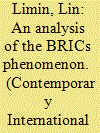

|
|
|
| 10 |
ID:
012193
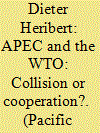

|
|
|
|
|
| Publication |
1997.
|
| Description |
19-38
|
|
|
|
|
|
|
|
|
|
|
|
|
|
|
|
| 11 |
ID:
132308
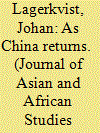

|
|
|
|
|
| Publication |
2014.
|
| Summary/Abstract |
This article investigates how perceptions of China in Mozambican civil society are affected by entrepreneurial activity and bilateral cooperation between China and Mozambique - real, imagined, visible and legal as well as clandestine and illegal in the agricultural and forestry sectors. The research problem concerns how discourse on Chinese investors is formed in Mozambique. Two questions are posed. How does Mozambican civil society perceive their room to maneuver at a time of Chinese growing economic interest and 'return' to Africa? What views exist on the policy space for the national government? Using qualitative ethnographic interviews to answer these overarching questions about expanding/contracting maneuvering space, this article explains how Mozambique's largest social group - peasants - the National Association of Small Farmers (UNAC) and other societal actors perceive Chinese investors. Informed by theoretical debates on civil society, the article argues that coinciding with China's large-scale return to Africa, an already tense dynamic between civil society and the state is picking up speed. It is argued that this phenomenon is likely to have more to do with African governments accruing more power and policy space than through direct impact of Chinese economic activity on African social life. However, to avoid negative discourse formation, China and host governments need to become more open on and transparent about bilateral agreements.
|
|
|
|
|
|
|
|
|
|
|
|
|
|
|
|
| 12 |
ID:
052624
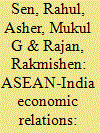

|
|
|
| 13 |
ID:
080908
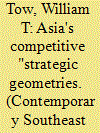

|
|
|
|
|
| Publication |
2008.
|
| Summary/Abstract |
Recent changes of government in Australia and Japan, and a pending one in the United States, signifies a historical crossroads in these three allies' security politics in the Asia-Pacific region. In recent years, all three countries have tended to rationalize their strategic collaboration on the need to build innovative and competitive-oriented "strategic geometries" as a means to counter China's growing power and to meet new types of threats in the region. Yet the Australian Government under John Howard simultaneously pursued a hedging strategy, exploiting its growing economic relationship with China while strengthening its diplomatic and strategic profile with the United States. Despite Tokyo's own substantial economic relationship with Beijing, recent Japanese leaders were unable to pursue the same type of "dual track" strategy to the same extent as Howard. With Kevin Rudd's election as the new Australian Prime Minister and Yasuo Fukuda's ascent to power in Japan, prospects for Australia and Japan to cultivate more independent politico-security ties with Beijing have strengthened. If so, the evolving regional security postures of both these US allies may compel the United States to reassess its own traditional skepticism towards multilateral security groupings in the region.
|
|
|
|
|
|
|
|
|
|
|
|
|
|
|
|
| 14 |
ID:
015456
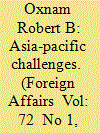

|
|
|
|
|
| Publication |
1992.
|
| Description |
58-73
|
|
|
|
|
|
|
|
|
|
|
|
|
|
|
|
| 15 |
ID:
103651
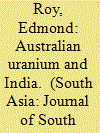

|
|
|
|
|
| Publication |
2011.
|
| Summary/Abstract |
This article is a study of the Australian government's policy of not selling uranium to India. Successive Australian governments have used the Nuclear Non-Proliferation Treaty (NPT) to refuse India's repeated requests for uranium. This study looks at the Indian response to this policy and asks how long Australia can sustain its stand in the face of climate change, economic growth and growing bilateral relations between two democracies with shared interests.
|
|
|
|
|
|
|
|
|
|
|
|
|
|
|
|
| 16 |
ID:
083792
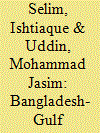

|
|
|
|
|
| Publication |
2008.
|
| Summary/Abstract |
The economic relations between Bangladesh and the oil rich Gulf Cooperation Council (GCC) countries are important for a developing nation like Bangladesh for a number of reasons. The countries of the Gulf, which are considered as one of the fastest growing economic blocs, remain the important sources of crude oil, remittances and overseas employment opportunities for Bangladesh and thus contribute significantly towards its economic development. Also, the Gulf nations have been assisting Bangladesh generously in various activities with aid and grants. In this backdrop, the current article will make an effort to assess Bangladesh's economic relations with the GCC countries. In the process of analysis, the article will look into trends and levels of remittances earned by Bangladesh from the Gulf nations. It will also focus on the current status of Bangladesh-GCC trade relations. Finally, this article will identify some challenges and prospects involved with the Bangladesh-GCC economic relationship.
|
|
|
|
|
|
|
|
|
|
|
|
|
|
|
|
| 17 |
ID:
140376
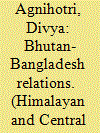

|
|
|
| 18 |
ID:
176286
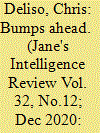

|
|
|
| 19 |
ID:
170708


|
|
|
|
|
| Summary/Abstract |
This article examines the Zionist business activity in Cyprus during the 1930s and discusses the motives of its ‘relocation’ from Mandatory Palestine to the neighbouring island. By examining the profile of the investors, the article argues that ideological and economic considerations shaped Jewish business networking in the Eastern Mediterranean. Apart from the benefits of trade protectionism, most of the Jewish ventures were run in Cyprus by businessmen devoted to Zionism, whose companies on the island would not only benefit them economically, but further support their role as economic carriers of the future Jewish state. Behind their business engagement, there was also the idea of generating Jewish-friendly settlements close to Palestine, where Jews from Central Europe could be accommodated as the migratory flow from Central Europe in the 1930s was increasing. This particular form of business activity marked also the rise of a Zionist business culture, which relied heavily on British markets.
|
|
|
|
|
|
|
|
|
|
|
|
|
|
|
|
| 20 |
ID:
132602
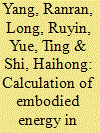

|
|
|
|
|
| Publication |
2014.
|
| Summary/Abstract |
In order to find efficient trade measures to reduce China×s energy consumption and to provide theoretical support for the climate talks between China and America, we investigate the impact of Sino-USA trade on energy consumption from the perspective of embodied energy. An Environmental Input-Output Life Cycle Assessment (EIO-LCA) model was established to calculate the total energy consumption coefficient, the direct consumption coefficient and the complete consumption coefficient of the sectors of the national economies of China and America. After taking into consideration the data of every sector of the national economy in Sino-USA trade, energy embodied in the import and export trade between China and America was calculated to verify the real energy flows in Sino-USA trade. The research results suggest the following: China is the net exporter of embodied energy in Sino-USA trade, and coal, crude oil and natural gas are the major components. In 1997-2011, the net exports of China×s embodied energy totaled 1523,082,200 t of standard coal, the amount of China×s energy consumption increased by 895,527,900 t of standard coal, and America×s energy consumption decreased by 11,871,200 t of standard coal as a result of Sino-USA trade. On this basis, corresponding policies and recommendations are proposed.
|
|
|
|
|
|
|
|
|
|
|
|
|
|
|
|